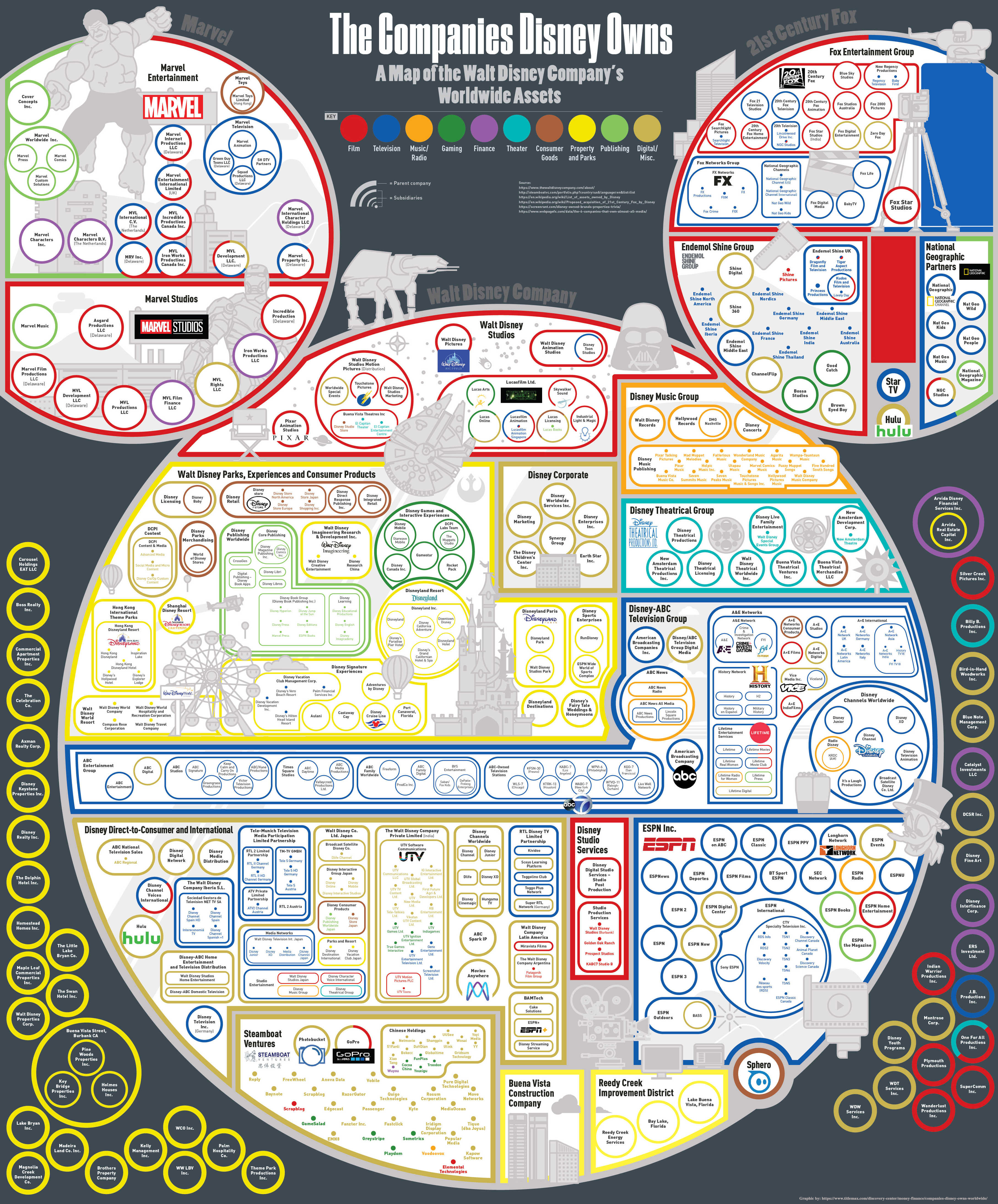News Story of the Day: Things started off well for Lyft, but it has been tumbling since its initial public offering (IPO). After receiving its first “sell” rating and a price target of $42, Lyft shed another couple of percentage points on Thursday. So far, Lyft shares have plunged more than eight percent since its debut, and things are not looking up as the market launched a $500 million short push against Lyft.
This does not bode well for Uber (SEE: Is Lyft’s 12% crash a sign of Uber’s future?).
Chart of the Day: If you purchased Disney stock around the time of the Great Recession, then you’d be raking in the dough. Under Bob Iger’s leadership, Disney has acquired a vast number of lucrative properties, including Marvel, Star Wars, and now 21st-Century Fox assets. It’s been incredible, except for ESPN, which has turned into the ESNPC sports channel.
Want to see how big Disney is? Here’s a chart that looks at everything the company owns:

Illustration of the Day: You gotta love the memes making fun of former Vice President Joe Biden being creepy, like this one. #HimToo?
Quote of the Day: Reason’s Katherine Mangu-Ward is out with a great piece showing how Tucker Carlson and Bernie Sanders have become allies in the blitzkrieg against too much stuff. She decided to insert the lovely Marie Kondo into the conversation. Here is an excerpt:
Sanders and Carlson are both fundamentally wrong about stuff and its relation to happiness. The person who best grasps the true dynamic isn’t a pundit, a philosopher, or an economist. She’s a self-help guru with two best-selling books and a new series on Netflix: the tiny Japanese deity of tidiness, Marie Kondo.
Kondo’s life’s work is to help people sort their belongings, toss a bunch of them, and put the rest away neatly. She calls it The Life-Changing Magic of Tidying Up. She asks her clients to hold each object they possess one at a time to decide if it “sparks joy.” If it doesn’t, one thanks the object and discards it. Sound anti-consumerist? It’s not: The insight that undergirds her entire system is that stuff can, in fact, make you happy.
There is such a thing as too much stuff, of course. America’s bulging attics and cluttered spare bedrooms are testaments to the burden that too many objects can impose. Anyone who has ever thought “I have nothing to wear” while standing in front of a packed closet knows that having an excess of choices cacophonously presented can be paralyzing.
But both the left and the right are subject to dangerous romantic fantasies about lives with limited choice. Conservatives tend to idealize a time when a less dynamic economy and fewer divisible assets kept families together in close quarters of sheer necessity, while liberals and progressives fondly imagine a world where the engine of the economy runs slower, work is more leisurely, and competition is less fierce.
Kondo does flirt with the idea that clutter makes you physically unwell—that it induces anxiety, bad eating habits, tension, and more. And she may be right. But if too much of the wrong stuff is bad for your health, not enough of the right stuff is much, much worse.
Tweet of the Day: An obscure economist by the name of Justin Wolfers is upset that Herman Cain might be nominated to the Federal Reserve. Not because Cain would likely be an inflationist and central planner, but because he advocated a gold standard and said the central bank was too political. Yikes. If this is what disqualifies you from serving at the Eccles Building to the left, then there is no reason anymore. Besides, when you think of Fed critics, Cain is not the first name that springs to mind.
Cain’s history of talking about the Fed is going to get awk…
– Advocated gold standard
– Claimed that monetary policy was too easy in early 2011 (when unemployment was 9%)
– Argued that the Fed was overly-politicized at a time when it had no-one as partisan as Moore or Cain. pic.twitter.com/IihmZAAccC— Justin Wolfers (@JustinWolfers) April 4, 2019
Video of the Day: One of the biggest myths is that breakfast is the most important meal of the day. This has been an accepted truth for eons, but there is no evidence that eating a plate of eggs, bacon, and toast will do anything for you in the long run. John Stossel explains more:

Leave a Comment